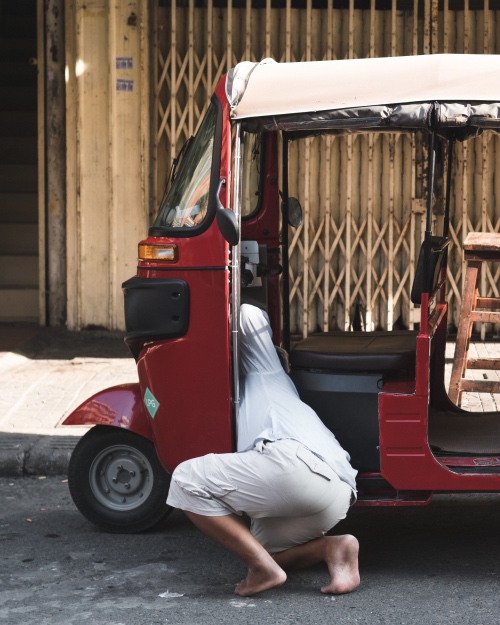London, UK
Thomson Reuters Foundation
Thousands of tuk-tuk drivers in Cambodia are to join the fight against human trafficking under a plan by the ride-hailing app Grab to train drivers to spot and report signs of exploitation.
Grab said on Friday it would provide training for 10,000 drivers in the capital Phnom Penh this month, as it launches a program it plans eventually to extend to millions of its drivers in Asia.

A tuk-tuk driver in Phnom Penh, Cambodia. PICTURE: Jon Tang/Unsplash.
“We recognise that taxi and tuk-tuk drivers can unknowingly be the first point of contact for traffickers and victims, especially at airports, bus terminals or train stations,” said Hashim Alkaff, head of Grab Cambodia.
“With the extensive network of driver-partners Grab has within Phnom Penh, we want to empower our drivers to serve as an extra pair of eyes and ears on the ground,” he told the Thomson Reuters Foundation.
More than 260,000 of Cambodia’s 16 million people are trapped in modern slavery, according to the Global Slavery Index by the Walk Free Foundation, often in farms, fisheries and construction, many of them children.
Thousands more are thought to have been trafficked internationally, including Cambodian women who are forced to marry men in China.
Last year the US State Department downgraded the country in its Trafficking in Persons report, meaning it must make improvements or face possible economic sanctions.
The head of Cambodia’s anti-trafficking agency, which is working with Grab on the initiative, said trafficking was rising despite increased police efforts and tuk-tuk drivers were an untapped source of information.
“It takes all sectors of society working together to defeat human trafficking,” said Chou Bun Eng. “Grab drivers can be like agents on the street.”
Hong Kong-based anti-trafficking charity Liberty House will deliver online lessons to the 10,000 drivers, while Child Helpline Cambodia, a local charity, will train them on the ground.
Drivers will be equipped to identify suspicious activity inside their vehicles – and also around the city’s streets, construction sites and late-night entertainment venues, said Sean Sok Phay, executive director at Child Helpline.
“Trafficking is everywhere: labour abuse, child exploitation, sexual abuse,” he said. “We want to remove any barriers that stop people from reporting it.”
Businesses worldwide are under increasing pressure to do their bit to fight human trafficking and modern slavery, which has entrapped 40 million people and generates an estimated $US150 billion each year.
Uber, which sold its South-East Asian business to grab in 2018, introduced similar initiative the same year.





